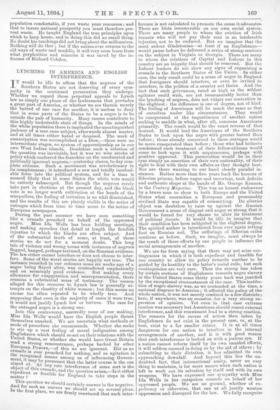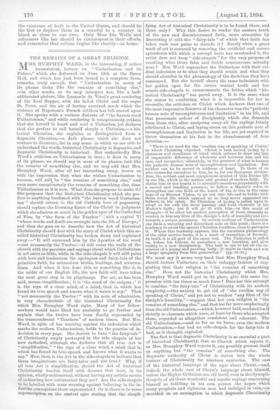LYNCHING IN AMERICA AND ENGLISH INTERFERENCE.
IT would be idle to affirm that the negroes of the Southern States are not deserving of every sym- pathy in the continued persecution they undergo. Whether we regard these perpetual appeals to Lynch law as simply one phase of the lawlessness that pervades a great part of America, or whether we see therein merely the hatred of one race for another, it is useless to deny that in some parts of the States to be a negro is to be outside the pale of humanity. Many causes contribute to this highly undesirable state of things. In the minds of the white population there is implanted the unextinguished jealousy of a race once subject, afterwards almost master, and at all times either hated or despised. The work of emancipation was accomplished at a blow,—there were no intermediate stages no system a apprenticeship as in our own West Indian islands. Doubtless such a solution of the question was inevitable, but it was no wise stroke of policy which conferred the franchise on the uneducated and politically ignorant negroes,—yesterday slaves, to-day com- plete citizens. Such a movement was revolutionary in its completeness; • it introduced a new and totally incalcul- able force into the political system, and for a time it seemed likely that in some States the white vote would be entirely submerged. But though the negroes rarely take part in elections at the present day, and the black vote is no longer worth cultivation at the hands of the wirepullers, the feeling of irritation is no whit diminished, and the results of this are plainly visible in the series of outrages which from time to lime come to the notice of European newspapers. During the past summer we have seen something like a crusade preached on behalf of the oppressed negro. Miss Ida Wells has been holding meetings, and making speeches that detail at length the fiendish injustice to which the blacks are often subject. And of the substantial truth of some, at least, of these stories we do not for a moment doubt. This long tale of violence and wrong teems with instances of negroes flogged, hanged, perhaps tortured, on the flimsiest evidence. The law either cannot interfere or does not choose to inter- fere. Some of the worst stories are happily not true. The instance recorded in our columns some six weeks ago of a negro being flayed alive, was contradicted emphatically and on seemingly good evidence. But making every allowance for exaggeration and misrepresentation, there remains a substantial mass of testimony The reason alleged for this recourse to Lynch law is generally at- tempts on the chastity of white women ; but this seems an excuse too often repeated to be wholly true. And supposing that even in the majority of cases it were true, it would not justify Lynch law or torture. The case for the outraged negro is a strong one. Into this controversy, assuredly none of our making, Miss Ida Wells would have the English people thrust themselves unasked. We are uncertain what methods or mode of procedure she recommends. Whether she seeks to stir up a vast feeling of moral indignation among Englishmen which should re-act on their relations with the United States, or whether she would have Great Britain send a strong remonstrance, perhaps backed by other European Powers,—of this we are ignorant. But as no crusade is ever preached for nothing, and as agitation is the recognised naeans among Govern- ment, it us of influencing Govern- i may be presumed that the latter course is the one aimed at. At any rate interference of some sort is the object of this crusade, and the question arises,—Is it either expedient or feasible for England to take steps in the matter ?
This question we should certainly answer in the negative. And for such an answer firmly should set up several pleas. In the first place, we are convinced that such inter- ference is not calculated to promote the cause it advocates. There are blots innumerable on our own social system. There are many people to whom the eviction of Irish tenants who will not pay their rent is an intolerable injustice, not to be endured. But we imagine that the most ardent Gladstonian—at least if an Englishman— would pause before he delivered a series of stump orations on the subject in Virginia or Georgia. There are many to whom the relations of Capital and Labour in this country are an iniquity that should be removed. But the Labour loaders do not show any signs of organising a crusade in the Southern States of the Union. In either case, the only result could be a sense of anger in England that foreigners should interfere, or even be invited to interfere, in the politics of a country not theirs. And the fact that such grievances, rated as high as the wildest agitator could wish, are yet immeasurably better. than the lynching of negroes, does not vitiate our contention in the slightest : the difference is one of degree, not of kind. The feeling of Americans will be much the same as that of ourselves under like circumstances. They would be exasperated at the impertinence of another nation seeking to meddle in what, after all, concerns Americans primarily. The result would be the exact reverse of that desired. It would lead the Americans of the Southern States to look upon the negro with greater hatred than before ; those already concerned in these outrages would be more exasperated than before ; those who had hitherto condemned such treatment of their fellow-citizens would come. to look upon it with acquiescence, perhaps with positive approval. This persecution would be in their eyes simply an assertion of their own nationality, of their right to deal with their own affairs as they thought best. Nor are there wanting to our hand closely parallel in- stances. Rather more than five years back the horrors of Siberian prisons, before vague and uncertain, took definite and authentic shape at the hands of Mr. George Kennan, in the Century Magazine. This was an honest endeavour by a brave man to show to both Europe and the United States what enormities a European and presumably civilised. State was capable of committing. Its ulterior object was doubtless to raise up against the Russian Government a sense of disgust and anger so strong that it would be forced for very shame to alter its treatment of political forcats. It would be idle to imagine that their condition has been mitigated in the slightest degree. The spirited author is interdicted from ever again setting foot on Russian soil. The sufferings of Siberian exiles continue as before. Such, we imagine, must always be the result of these efforts by one people to influence the social arrangements of another. We are far from saying that there may not arise con- tingencies in which it is both expedient and feasible for one country to allow its policy towards another to be guided by its hostility to the latter's social evils; but such contingencies are very rare. Thus the strong line taken by certain sections of Englishmen towards negro slavery in the United States some thirty years back was justified by the exceptional circumstances of the ease. This institu- tion of negro slavery was, as we contended at the time, a, national disgrace to America ; it affected the policy of the whole .nation, it was not merely confined to a few districts; here, if anywhere, was an occasion for a very strong ex- pression of opinion. Yet even in that case extreme caution was necessary lest Americans should resent external interference, and this resentment lead to a strong reaction. The reasons for the course of action then taken by Englishmen do not exist in the present case, or, at the beat, exist to a far smaller extent. It is at all times dangerous for one nation to interfere in the internal arrangements of another, and it is with good reason that such interference is looked on with a jealous eye. If a nation cannot reform itself by its own unaided efforts, it will seldom succeed in doing so by the aid of others ; by submitting to their dictation, it has admitted its own approaching downfall. And beyond this lies the un- doubted fact, that international amity, never an easy thing to maintain, is far more secure when each nation is left to work out its salvation by itself and with its own weapons. We have expressed our sympathy with Miss Ida Wells in her outspoken crusade on behalf of her oppressed people. We see no ground, whether of ex- pedieng or otherwise, that can at all justify wanton oppression and disregard for the law. We fully recognise the existence of both in the United States, and should be the first to deplore them as a scandal to a country in blood so close to our own. Only Miss Ida Wells and reformers like her should be circumspect in their efforts, and remember that reform begins like charity—at home.



































 Previous page
Previous page